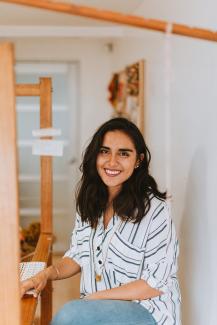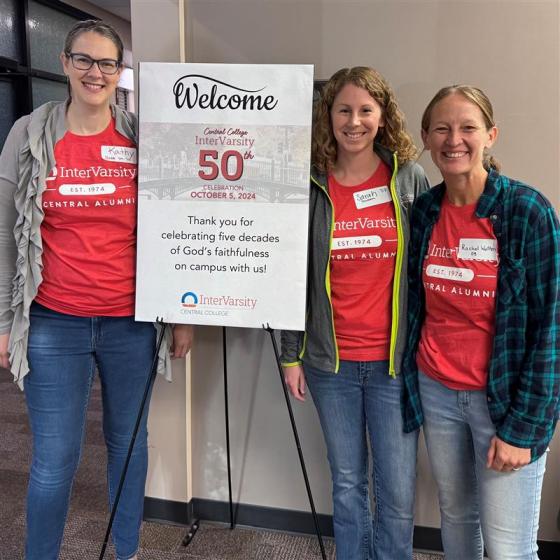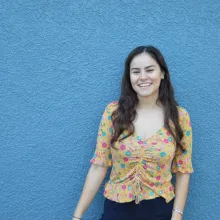Sisterhood and Sustainability: Tatiana Ordoñez and the Zuahaza Story

Tatiana Ordoñez is a business owner partnering with artisans in Colombia. She’s also an InterVarsity alumna! We sat down with her on the InterVarsity World Changers podcast to hear about how she started Zuahaza, a sustainable textile company. Below is a summary of her story.
When Tatiana first met InterVarsity, she was an international student studying at the Maryland Institute College of Art in Baltimore. As a freshman, she prayed that God would provide her with a Christian community on campus. That prayer was answered when some people at a welcoming booth for international students told her about a club called InterVarsity. She started attending and eventually met some of her closest friends at a worship night.
“I see it as a moment where God answered a lot of prayers from our students. We were all scattered around school, in our dorm rooms, praying for community and friends. And then that night, we all kind of just met each other,” she said.
Her transformation continued a couple of years later when she took a university trip to Türkiye. There, she met an NGO that preserved cultural crafts being lost to mass production. The NGO worked to give locals the time and space to produce their crafts while also sustaining their livelihoods through jobs. It was this experience that led Tatiana to wonder if God wanted her to use her own love of textiles to serve others.
“There's so much history, so much culture. I was fascinated by the way textiles are kind of a language on their own,” she said.
After graduating from college and gaining some knowledge about the fashion industry, Tatiana moved back to Colombia to start her textile business, “Zuahaza.” However, instead of a nonprofit, she decided to start a social enterprise focused on people.
Forming Sisterhood Through Ethical Business
“Zuahaza” is a made-up word combining two indigenous words from the mountainous region of Colombia where Tatiana is originally from. The two words mean “my” and “sister.”
Although the women of Zuahaza make and sell decorative home goods like pillows, blankets, and table linens, they are more than a business; they’re a sisterhood. Tatiana doesn’t see herself as a boss, but rather a partner working side-by-side with local women artisans to build each other up. Zuahaza primarily employs women because in Colombia, women are traditionally the ones who make these kinds of crafts.
Tatiana tries to ensure Zuahaza grows at a sustainable rate by using materials that are friendly to the Earth and friendly with the people who use it. While this means items get made at a slower pace, she believes it’s worth it in order to live out her values.
“The model of work that I want to do is make something and always pay the artisans. Then when we have enough money, make more things,” she said.
The cotton used is grown in Colombia, and natural dyes are created using native plants. Her business model reduces environmental impact, preserves traditional Colombian craftsmanship, and creates fair-wage jobs in rural areas.
Even more than making sure her business is sustainable, Tatiana prioritizes her relationships with her co-workers.
“I want to treasure the wonderful women that God put in my life to be able to work with,” she said. “We’ve become actual friends; we have grown together. We've seen each other in bad moments and in good moments.”
Starting a business has been one of the hardest things Tatiana has ever done. As someone who’s always considered herself an artist and not a businessperson, she’s had to grow her understanding of what it means to trust God. And just as she trusted God to provide her community through InterVarsity as a student, she trusted him to faithfully provide her opportunities and community through Zuahaza.
Art as Kingdom Work
“I sometimes see artwork and I'm amazed at how in the world that came to be. We are image bearers of God. And he made us to be able to create things beautifully, the way that he creates things beautifully,” Tatiana said.
Her artist community in Baltimore also played a role in helping her start Zuahaza.
“[Baltimore] was not just a bubble of art and galleries,” she said. “[We were] always making sure that whatever we were learning in school, we were taking out [to the world].”
Similarly, InterVarsity shapes students to be full life-disciples, teaching them how to take what they learn on their campuses back home and out into the world.
“If we set our hearts on it, God can really transform us to grow into citizens of the kingdom,” Tatiana said.
Listen to the rest of Tatiana’s story here! And pray for world changers like her as they continue serving God, his creation, and his people in powerful ways.
Categories








